{UAH} 'A hungry man is an angry man' – fear and despair stalk streets of Harare
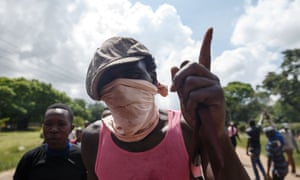
'A hungry man is an angry man' – fear and despair stalk streets of Harare
In a poor neighbourhood on the outskirts of the Zimbabwean capital, residents reeling from a brutal crackdown describe the impact of food and fuel shortages
by Jason Burke in Harare
Every morning this past week, Innocent Tinashi has set out very early from his small wood and tin home in Epworth, a poor neighbourhood on the outskirts of Harare, to walk the seven miles into the city centre in the hope of seeing his wife, Maria.
Epworth witnessed some of the fiercest violence during a protest "shutdown" that plunged Zimbabwe into a fresh crisis 12 days ago – and some of the most brutal repression that followed.
Across the country, 12 people have been shot dead, hundreds injured and more than 1,500 detained in the disorder and the subsequent crackdown,according to assessments by observers and diplomats in Harare. Every day brings reports of further beatings, assaults, abductions and arrests by the police and military.
Among those picked up was Maria: 25, unemployed and a mother to a five-year-old boy and a eight-year-old girl, she was an unlikely troublemaker. Like other detainees, she has been charged with public disorder offences that could mean a lengthy prison sentence.
"There was violence outside our home and rioting and problems so we stayed inside all day," said Tinashi, a thin 36-year-old who earns a bare living selling bananas. "We are not political people. But the police came when we were sleeping. They smashed down our door. I hid in a wardrobe. They took Maria."
Protesters barricade the main route to Harare from Epworth township after a huge rise in fuel prices. Photograph: Jekesai Njikizana/AFP/GettyThe immediate trigger for the shutdown – a closure of all businesses and non-essential services to demonstrate anger – was a sharp rise in fuel prices ordered by the government. Overnight, petrol went from $1.50 a litre to well over three dollars. The rise came against a background of a deteriorating economic situation that has already hit people in places like Epworth very hard.
Fourteen months ago, Robert Mugabe, who had ruled Zimbabwe since 1980, was ousted by the army. The 94-year-old autocrat's rule left the country with a crumbling infrastructure, massive debts, no currency of its own and extreme levels of unemployment. Mugabe's successor was 76-year-old Emmerson Mnangagwa, a ruling party stalwart who immediately pledged political and economic reform. Neither has come, or at least not rapidly enough to head off crisis.
Protesters stand behind a burning barricade during protests earlier this month. Photograph: Philimon Bulawayo/ReutersIn the centre of Epworth, where 160,000 people live in a sprawl of small huts, shelters and houses, lies a crossroads with a market and a row of bars where young men eat grilled offal, drink cheap beer and shoot pool. Many still bear the scars of the battles with police – and the beatings – from the week before.
"A hungry man is an angry man," said Robert, 36, who has lived in Epworth all his life. "People wanted and expected a change but things are much tougher than under the previous president. The young people are not happy … There are no schools, no jobs."
People jostle for a chance to buy a loaf of bread from a vendor at a market in Bulawayo. Photograph: Zinyange Auntony/AFP/Getty ImagesPrices of all commodities have soared in recent weeks, and a single cabbage on the battered stalls in Epworth's market now costs a dollar. Locals describe teenage girls forced into sex work; boys addicted to homemade narcotics.
Outside the small local health clinic, Mercy Mapeki, a mother of three whose husband is ill and unable to work, said the family often went without food. "Sometimes I borrow some [maize] from the neighbours, but they have nothing either these days. If the children are sick, we pray," the 32-year-old said.
The early signs following Mugabe's fall were relatively positive. Mnangagwa's victory in an election held in July was contested but the campaign was considerably more free than any for decades. Senior ministers spoke of previous mistakes and how Zimbabwe was now returning to the right path. The former British colony was "open for business", they repeated. There were signs that the foreign investment desperately needed to create jobs and growth might come.
A supermarket looted during recent protests in Harare. Photograph: Philimon Bulawayo/ReutersBut widespread scepticism at home and abroad appeared vindicated when six civilians were shot by soldiers during protests in Harare two days after the polls. Many suggested a hardline faction within the ruling party were responsible, unhappy with even the limited reforms that might have convinced investors and international multilateral institutions to provide the funds to resuscitate the economy.
Today, any remaining illusions have been shattered. The crackdown of the past fortnight has been the most extensive for a decade at least, and veteran campaigners in Harare worry that it is far from over.
"It could be the start of a concerted effort to destroy any opposition of any type that could last weeks, even months," said one old hand, recalling a campaign of regime violence in 2008 that led to 270 deaths.
A shopkeeper shows a supermarket roof damaged by looters during recent protests in Harare. Photograph: Philimon Bulawayo/ReutersSignificantly, the targeting of the opposition, union leaders and civil society activists has continued even after Mnangagwa cut short a foreign trip to pledge dialogue and punishment for security officials who committed excesses.
Diplomats in Harare admit it is almost impossible to work out where real power lies, among competing institutions, agencies, personalities and factions. The result is a sense of deep uncertainty, and fears that Zimbabwe is moving into uncharted waters where anything is possible.
One innovation under Mnangagwa is "fast-track" trials for the vast numbers detained in recent days. "The rule of law has been entirely abandoned .. It's a travesty of justice," said Derek Matyszak, an analyst in Harare with the Institute for Security Studies.
Each day last week, 56 accused men and five women from Epworth filed into court nine in at Harare's central magistrates' court to face trial. They are represented by just five lawyers, who managed to win a postponement of 48 hours to allow them to interview their clients.
Few of the accused are likely to be freed; even those caught up by mistake like Maria. Most will face months, even years, in jail, lawyers said.
Evan Mawarire is taken into a vehicle by police outside his home in Harare. Photograph: Philimon Bulawayo/ReutersFive prominent activists have been charged with subversion. They include Evan Mawarire, a preacher and activist known for his resistance to Mugabe's rule.
Nor is it clear how the government can halt the economy's slide without external aid.
Persistence Gwanyanya, an independent economist in Harare who has worked closely with the government, said Zimbabwe was "taking a painful pill at the moment" but that there were some "quick wins" possible. "We are in a transition … We can expect things to get worse before they get better but I don't expect the suffering to be extended for a long time," Gwanyanya said.
A measure of has calm returned to much of Zimbabwe now, with traffic approaching normal levels in the cities and the internet, shut down for several days, working once more. But few are optimistic in the long term.
Marion Michasa, 40, was waiting outside Harare magistrates court to see her husband, a 51-year-old car trader in Epworth who was swept up in the dragnet during last week's riots when he tried to get to work in the centre of the city on a bicycle.
"Life is so difficult," she said. "Right now we are so confused. We are still living with fear."
Disclaimer:Everyone posting to this Forum bears the sole responsibility for any legal consequences of his or her postings, and hence statements and facts must be presented responsibly. Your continued membership signifies that you agree to this disclaimer and pledge to abide by our Rules and Guidelines.To unsubscribe from this group, send email to: ugandans-at-heart+unsubscribe@googlegroups.com

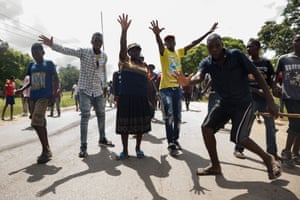
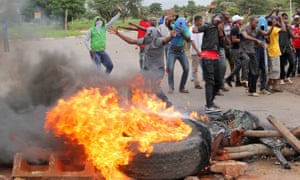
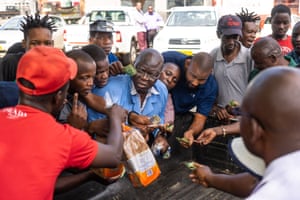
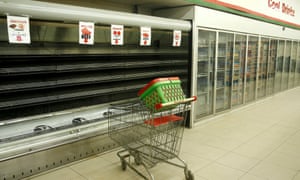
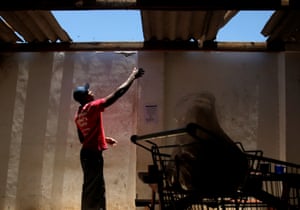
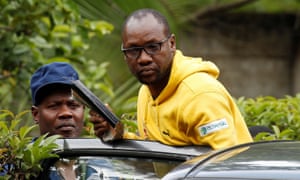





0 comments:
Post a Comment